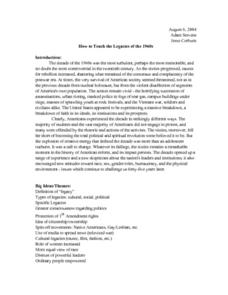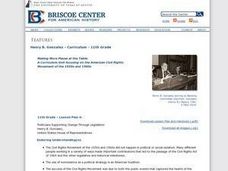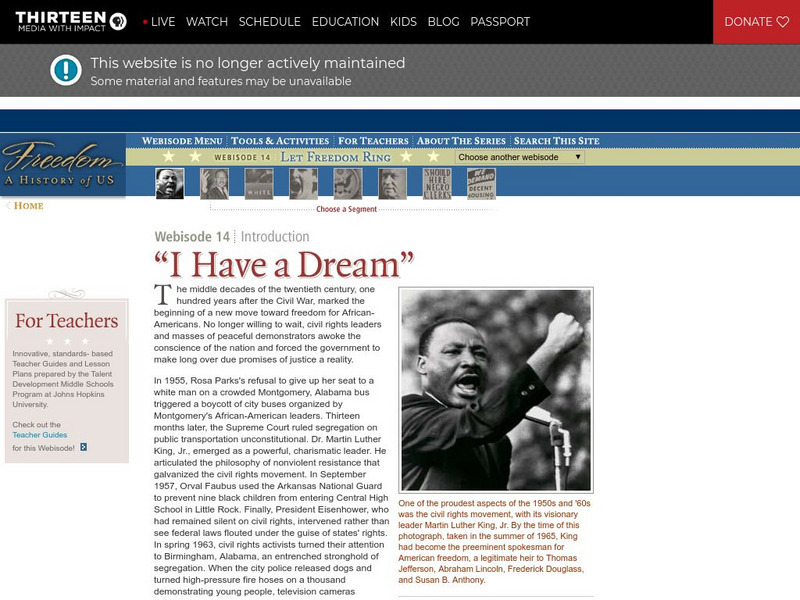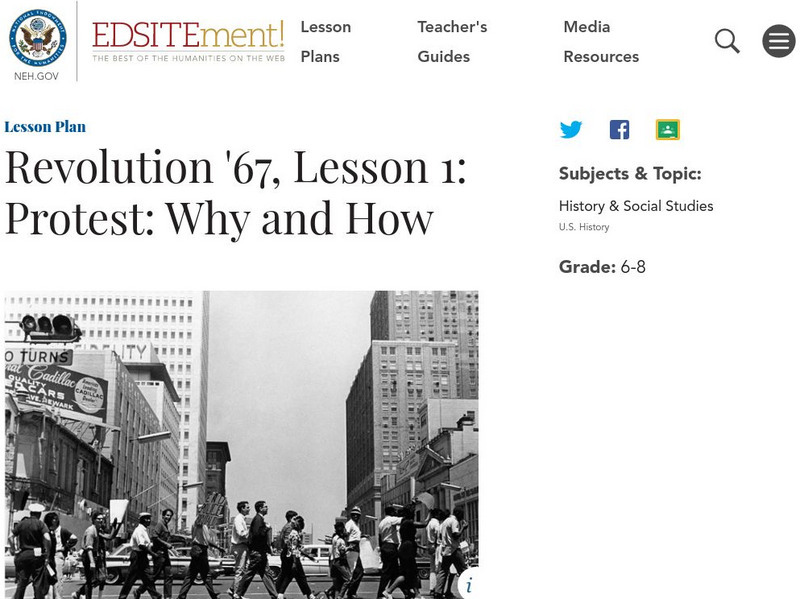Curated OER
1960 America: Foreign Policy
The 1960's marked shifts in American culture, politics, and policy. Your class groups up to research a series of primary source documents resulting in a timeline and a 15 minute oral presentation. Active learning all the way.
Curated OER
President Kennedy and Kentucky Politics
Students explore the interactions between Kentucky Governor Bert Combs and President Kennedy. They examine JFK's interest in Kentucky politics and construct history through Governor Bert Comb's interview.
Curated OER
Speak Out!
Students are introduced to Yvonne Ranier's "Trio A" dance and investigate how to express concern over social issues through choreography. They research important issues from the 1960's, choreograph and perform original dances.
Curated OER
Clash of Cultures: Comparing the 1920s and 1960s
Students compare the social, cltural and politicalp roblems of the 1920s with the 1960s.
Curated OER
The Brief American Pageant: The Stormy Sixties
Intended for use with The American Pageant by David Kennedy, Lizabeth Cohen, and Mel Piehl, this slideshow includes maps and graphs that detail politics and social dynamics in 1960's America. The textbook is not necessary for...
Curated OER
The Vietnam War
Using poignant images, this presentation makes a statement about the Vietnam War. While the lists and information in the presentation show an anti-war bias, it could be used as a discussion-starter. High school students could use the...
Curated OER
Desegregation of Schools
Students explore ways African American students were discriminated against in the 1960's. In this United States History lesson, students read three famous poems on the Civil Rights Movement then write their own poem.
National First Ladies' Library
Fashion Trends in the 1960s: Hippies, Flower Children, and Design
Middle schoolers use the Internet to research and examine clothing styles of 1960s, draw pictures of various clothing and accessories popular in that decade, trace images on top of foil tray or pan to design a stamp, and make...
Curated OER
How to Teach the Legacies of the 1960s
High schoolers consider which aspects of world around them have roots in 1960s, research and compare 1960s to today with regards to Civil and Women's Rights, Vietnam, counterculture, music, voting, and economic rights, and explore legacy...
Curated OER
Activating Students
Students view and analyze one example of student activism in the 1960's and then apply their learning to their own situations. They work cooperatively to develop and implement their own "activist" or community service learning plan.
Curated OER
Finding Our Place in Time
Young scholars utilize interviewing skills of an historian to research the time period of the 1970's. They use prior knowledge of the 1960's to explain the mood of the country in the 1970's.
Curated OER
1960s Word Search
For this social studies worksheet, students find the words that describe the world according to the 1960's. The answers are found at the bottom of the page.
Curated OER
Following Sean Lesson Plan
High schoolers view a film about two families living in San Francisco during the 1960s. They examine clips of the film and take notes on its historical context and discuss what historical information can be received from first-hand...
Curated OER
Turmoils of The 1960's and 70's.
Students engage in the study of the social problems associated with the 1960's and 1970's. They explain how the government made attempts to solve the problem and evaluate the success. This is done through the writing of an essay using...
Curated OER
Watsons Go To Birmingham--1963Patricia Wachholz
Students research the 1960s to prepare for reading the book, The Watsons Go To Birmingham, by Christopher Paul Curtis. They watch a documentary, create a timeline, and listen to music from the 1960s.
Curated OER
Making More Places at the Table: The American Civil Rights Movement of the 50's and 60's
Eleventh graders examine the biography of Henry B. Gonzalez. They examine primary source documents from Congressman Gonzalez's personal papers related to his contributions to the Civil Rights Movement.
BBC
Bbc: On This Day
News reports--some with audio, video and eye-witness accounts--of significant events, 1950-2005, that occurred on today's date. Search by date, year, or theme.
OpenStax
Open Stax: u.s. History: 29.4 Challenging the Status Quo
Page form U.S. History e-book focusses on the culture of the 1960s and the rise of protest organizations challenging the status quo during that decade. Site contains questions for review, critical thinking, and glossary.
PBS
Wnet: Thirteen: Freedom: A History of Us: Webisode 14: Let Freedom Ring
Series episode covers the civil rights movement and the struggle for equality in post-World War II America.
Other
Letter From Birminghham Jail [Pdf]
This letter shares Martin Luther King's reflections about his involvement in peaceful demonstrations. The letter provides historical information about the plight of African Americans throughout history and why he and others are so...
PBS
Pbs Learning Media: Writing in u.s. History: 1968: A Time of Change
Explore how the events and cultural and political changes that occurred in 1968 came to represent the upheaval and dramatic changes in American life during the 1960s. In this interactive lesson from WGBH, students develop a written...
National Endowment for the Humanities
Neh: Edsit Ement: Revolution '67, Lesson 1: Protest: Why and How
In this lesson plan, learners examine the reasons for protests by reading about the riots in Newark, New Jersey, in 1967. By using primary source documents, learn historical reasons for protesting and compare them with the situation in...
National Endowment for the Humanities
Neh: Edsit Ement: Revolution '67:What Happened in July 1967? How Do We Know?
In this lesson plan, students learn about the riots in Newark, New Jersey, in 1967. Using primary sources, identify the causes of the disturbance in July, 1967. Links to the relevant information is provided.
PBS
Pbs: Negroes With Guns: Rob Williams & Black Power
Tells the story of civil rights activist Rob Williams and his belief that Black Americans needed to draw guns on violent racists.





















![Letter From Birminghham Jail [Pdf] Primary Letter From Birminghham Jail [Pdf] Primary](https://d15y2dacu3jp90.cloudfront.net/images/attachment_defaults/resource/large/FPO-knovation.png)


